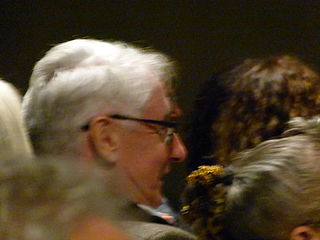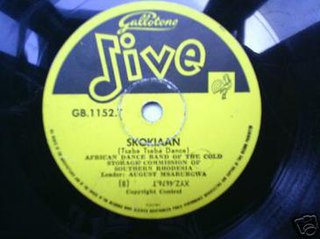Related Research Articles

Kevin Volans is a South African born Irish composer and pianist. He studied with Karlheinz Stockhausen and Mauricio Kagel in Cologne in the 1970s and later became associated with the Neue Einfacheit movement in the city. In the late 1970s he became interested in the indigenous music of his homeland and began a series of pieces which attempted to combine aspects of African and contemporary European music. Although Volans later moved away from any direct engagement with African music, certain residual elements such as interlocking rhythms, repetition and open forms are still detectable in his music since the early 1990s which takes a new direction more redolent of certain schools of abstract art. He settled in Ireland permanently in 1986 and was granted Irish citizenship in 1995.

"Skokiaan" is a popular tune originally written by Zimbabwean musician August Musarurwa in the tsaba-tsaba big-band style that succeeded marabi. Skokiaan refers to an illegal self-made alcoholic beverage typically brewed over one day that may contain ingredients such as maize meal, water and yeast, to speed up the fermentation process. The tune has also been recorded as "Sikokiyana," "Skokiana," and "Skokian."
Hendrik Pienaar Hofmeyr is a South African composer. Born in Cape Town, he furthered his studies in Italy during 10 years of self-imposed exile as a conscientious objector. While there, he won the South African Opera Competition with The Fall of the House of Usher. He also received the annual Nederburg Prize for Opera for this work subsequent to its performance at the State Theatre in Pretoria in 1988. In the same year, he obtained first prize in an international competition in Italy with music for a short film by Wim Wenders. He returned to South Africa in 1992, and in 1997 won two major international composition competitions, the Queen Elisabeth Music Competition of Belgium and the first edition of the Dimitris Mitropoulos Competition in Athens. His 'Incantesimo' for solo flute was selected to represent South Africa at the ISCM World Music Days in Croatia in 2005. In 2008 he was honoured with a Kanna award by the Kleinkaroo National Arts Festival. He is currently Professor and Head of Composition and Theory at the South African College of Music at the University of Cape Town, where he obtained a DMus in 1999.
Amampondo is a South African percussion ensemble that was started by Dizu Plaatjies in Langa, Cape Town in 1979. The name in Mpondo means people of Mpondo or Pondoland, a kingdom in the Eastern Cape where most of the band's members grew up. The other founding members were Simpiwe Matole; Michael Ludonga; Mzwandile Qotoyi; Leo Mbizela and Mandla Lande. National Geographic called them "one of the most interesting and experimental groups in South Africa".

Zim Ngqawana was a South African flautist and saxophonist. He was later known as Zimology.

Michael Blake is a South African contemporary classical music composer and performer. He studied in Johannesburg in the 1970s and was associated with conceptual art and the emergence of an indigenous experimental music aesthetic. In 1976 he embarked on 'African Journal', a series of pieces for Western instruments that drew on his studies of traditional African music and aesthetics, which continued to expand during two decades in London until he returned to South Africa in 1998. From around 2000 African music becomes less explicit on the surface of his compositions, but elements of rhythm and repetition remain as part of a more postcolonial engagement with material and form. He works in a range of styles including minimalism and collage, and now also forages for source material from the entire musical canon.
Christian Victor Hely-Hutchinson was a British composer, conductor, pianist and music administrator. He is best known for the Carol Symphony and for humorous song-settings.
Thomas Rajna is a British pianist and composer of Hungarian birth. He has been domiciled in Cape Town in South Africa since 1970.
Jürgen Bräuninger was a German-born South African composer.

The Fitzwilliam Quartet (FSQ) is a British string quartet. The group was founded in 1968 by four Cambridge undergraduates. There have been a number of changes in personnel over the years, but Alan George from the original quartet is still a member as of 2019. It currently consists of Alan George, viola; Sally Pendlebury, violoncello; and Lucy Russell and Marcus Barcham Stevens, violins.
Isak Roux is a South African born German composer born in 1959. He is known for his arrangements of South African music, especially his work with the musical groups Ladysmith Black Mambazo and Kwela Tebza.
NewMusicSA is the South African section of the International Society for Contemporary Music (ISCM). Its formation on 10 May 1999 heralded the return of South African representation at the ISCM after many decades.
Graham Newcater is a South African composer of serial music.
Michael Rosenzweig, born 1951 in Oranjezicht, a suburb of Cape Town, is a South African composer, conductor and jazz musician.
Freda Swain was a British composer and music educator.
The Documentation Centre for Music (DOMUS) forms part of the Special Collections Division of the Music Library within the Stellenbosch University Library and Information Service and is located in the Music Department. Collections acquired through acquisitions, donations or bequests over more than 50 years form the main holdings and are mostly of South African but also of international significance.
Gideon "Mgibe" Nxumalo [] was a South African jazz pianist and marimba player, acclaimed also as a composer and arranger. Nxumalo has been hailed as "perhaps one of South Africa's greatest unsung musical and cultural heroes."
Nofinishi Dywili (1928–2002) was a traditional Xhosa musician who achieved much recognition throughout her lifetime. She is regarded as the master of "uhadi" music and the master of Xhosa Thembu song productions such as The Bow Project.
The Uhadi musical bow is a traditional Xhosa musical instrument. It is a large unembraced musical bow which is attached to a resonator and played by percussion. The length of the string bow ranges from 115 to 130 centimeters. Similar musical bows in Southern Africa include the ‘’thomo’’ in Sotho music and the ‘’ugubhu’’ in Zulu music.